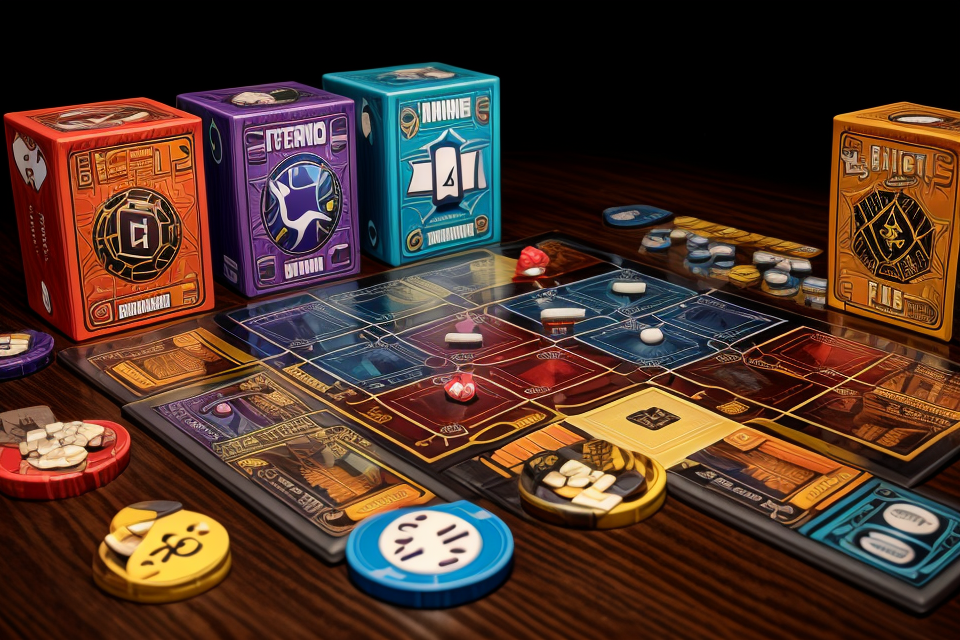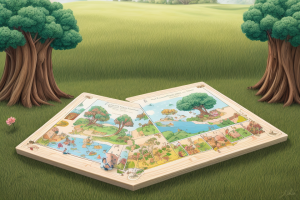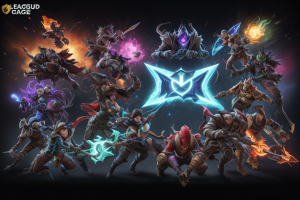
Are you ready to test your observational skills and unleash your inner detective? Look no further than the intriguing board game that has players guessing the identity of mysterious characters. In this captivating game, you’ll be transported to a world of deception and deduction as you try to figure out who is hiding behind the mask. With endless possibilities and surprises at every turn, this game is sure to keep you on the edge of your seat. Get ready to flex your mental muscles and outsmart your opponents as you race to uncover the truth. Who will be the ultimate detective? The game is afoot!
The board game “Guess Who?” is a mystery game where players take turns asking questions to figure out the identity of a hidden character. Players use clues from the character’s appearance and personality to determine who they are. The game is designed for two to six players and is suitable for players of all ages. The goal of the game is to be the first player to correctly guess the identity of the hidden character. The game is played by drawing a card with a character’s appearance and personality traits, and then asking questions to determine who that character is. The game is a fun and challenging way to improve observation and deduction skills.
The Exciting World of Board Games
Popular Board Games
The world of board games is vast and exciting, with new games being developed all the time. Here are some popular board games that are worth exploring:
- Monopoly: This classic game has been around for over 80 years and is still a favorite among many. Players roll dice to move around the board, buying and selling properties, and charging rent to their opponents. The objective is to become the wealthiest player by owning the most valuable properties.
- Scrabble: Scrabble is a word game that involves players placing tiles with letters on a game board to create words. The goal is to score the most points by creating words with high-value letters and placing them in strategic locations on the board.
- Clue: In this game, players must solve a murder mystery by figuring out who committed the crime, with what weapon, and in which room. Each player takes turns making suggestions and asking questions to gather more information about the case.
- Risk: This strategy game involves players taking control of different countries and battling each other for territory. The objective is to conquer the world by defeating other players’ armies and taking over their territories.
- Codenames: In this game, players work together to guess words based on clues given by their teammate. The goal is to guess as many words as possible while avoiding any words that might be misinterpreted or have negative connotations.
These are just a few examples of the many popular board games available. Whether you prefer strategy games, word games, or something else entirely, there’s a board game out there for everyone.
Board Game Culture
The world of board games has seen a resurgence in recent years, with a growing community of enthusiasts who gather to play and share their love for these games. This renewed interest has led to a proliferation of new games, as well as a deeper appreciation for the classics. The board game culture is one that values strategic thinking, social interaction, and fun.
The Appeal of Board Games
There are many reasons why people are drawn to board games. For some, it’s the tactile experience of handling the pieces and manipulating the board. For others, it’s the challenge of outwitting opponents and executing a clever strategy. And for some, it’s simply the joy of spending time with friends and family around a table.
The Evolution of Board Games
Board games have been around for centuries, with the earliest known board game dating back to ancient Egypt. Over time, they have evolved from simple dice and card games to complex strategic affairs that require hours of play and careful planning. Today’s board games cover a wide range of themes and mechanics, from cooperative games that emphasize teamwork to cutthroat competitions where the goal is to eliminate opponents.
The Community of Board Gamers
The board game community is a vibrant and diverse group of people who share a passion for these games. They gather in local game stores, online forums, and at special events like conventions and tournaments. Many players enjoy designing and creating their own games, as well as modifying existing ones to suit their preferences. This DIY ethos has led to a thriving indie game scene, with many innovative and unique games being produced by small companies and individual designers.
The Future of Board Games
As technology continues to evolve, there is a growing interest in digital board games that can be played online or on mobile devices. While some worry that this may lead to the decline of traditional board games, many enthusiasts believe that the two can coexist and even complement each other. The appeal of physical board games is still strong, and as long as there are people who enjoy the tactile experience and social interaction of playing together, these games will continue to thrive.
Guess Who: The Game of Unmasking Mystery Characters
Overview of Guess Who
Guess Who is a classic board game that has been entertaining players for decades. It is a game of deduction and mystery, where players must use their powers of observation and deduction to unmask the identity of a hidden character. The game is played with a set of characters, each with unique features, and players take turns asking questions to gather information about the characters. The goal of the game is to be the first player to correctly guess the identity of the hidden character.
In Guess Who, each player takes on the role of a detective, trying to uncover the identity of a hidden character. The game board is set up with a grid of characters, each with unique features such as hair color, facial hair, hats, glasses, and more. One player is chosen to be the game’s “mystery character,” and they choose a character to hide behind, so that only their features are visible to the other players.
Players take turns asking questions of the other players, who must answer with either a simple “yes” or “no.” Players can ask questions about the characters’ features, such as “does the character have blue eyes?” or “is the character wearing a hat?” If a player thinks they know the identity of the mystery character, they can make a guess, but if they are wrong, they are “out” for the rest of the game.
The game continues until one player correctly guesses the identity of the mystery character. That player is the winner, and the game can be played again with a new mystery character and a new set of questions.
Guess Who is a game that requires players to use their powers of observation and deduction to solve the mystery. It is a game of strategy, as players must decide which questions to ask and how to use the information they gather to make an educated guess. With its simple rules and engaging gameplay, Guess Who is a favorite among both children and adults.
Gameplay Mechanics
Characteristics of a Mystery Character
The mystery character in Guess Who is a fictional individual with specific characteristics that the players must deduce. These characteristics can include physical attributes, such as hair color, facial features, and height, as well as personality traits, such as interests, hobbies, and occupation. The objective of the game is for the players to use a combination of deductive reasoning and strategic questioning to uncover the identity of the mystery character.
Guessing Rounds
Guess Who is played in a series of rounds, with each round beginning with one player being designated as the “questioner.” The questioner has the opportunity to ask the other players up to five yes or no questions to gather information about the mystery character. The questions can be directed at any player, including the character’s identity or any other aspect of the character’s profile.
Strategic Questioning
In order to successfully guess the mystery character, players must engage in strategic questioning. This means that players must carefully consider which questions to ask and how to phrase them in order to gather the most information possible without revealing the character’s identity. Players must also consider the order in which they ask their questions, as they may need to follow up on previous questions in order to gather more information.
Guessing the Mystery Character
Once the questioner has asked their five questions, they must make a guess at the identity of the mystery character. If the questioner correctly guesses the character’s identity, they become the new mystery character and the game continues. If the questioner is incorrect, the next player has a chance to guess the character’s identity.
Game End Condition
The game of Guess Who ends when one player correctly guesses the identity of the mystery character or when all players have had a chance to be the questioner. At this point, the player with the most correct guesses is declared the winner.
Overall, the gameplay mechanics of Guess Who require players to engage in strategic questioning and deduction in order to uncover the identity of the mystery character. The game is designed to be both challenging and entertaining, providing hours of fun for players of all ages.
Objective of the Game
The objective of the game is to unmask the mystery character by asking questions and gathering information about them. The player must figure out the identity of the character while the other players try to mislead them by giving incomplete or misleading information. The player who correctly identifies the character first wins the game.
Strategies for Winning
- Observe and listen: The first step to winning the game is to carefully observe the other players’ questions and their reactions to the answers. Pay attention to their body language, tone of voice, and choice of words. This will give you valuable clues about the hidden character’s identity.
- Ask strategic questions: A well-placed question can reveal a lot of information about a character’s identity. Think about the character’s occupation, appearance, and personality traits when formulating your questions. It’s also important to remember that some questions may be more helpful than others, so choose your questions wisely.
- Use deduction: As the game progresses, use your deduction skills to narrow down the list of possible characters. Eliminate those who are unlikely to be the hidden character based on the information you have gathered from the other players’ questions. This will help you focus on the most likely suspects and increase your chances of winning.
- Collaborate with your team: Guess Who is a team game, so work together with your teammates to gather information and eliminate characters. Share your observations and thoughts with them, and discuss your strategy to ensure that everyone is working towards the same goal.
- Adapt to the other players’ styles: Each player has their own style of playing Guess Who. Some may be more aggressive in their questioning, while others may be more reserved. Observe how the other players are playing and adapt your strategy accordingly. This will help you anticipate their moves and stay one step ahead of them.
Tips for Playing Guess Who
- Begin by selecting a mystery character card and reading the clues aloud to the other players. These clues can include physical attributes, occupations, and personality traits.
- The other players will then ask yes or no questions to gather more information about the character. It’s important to keep track of the questions asked and the answers given to avoid repeating them.
- Players should also take note of any conflicting information provided by their fellow players to help them narrow down their guesses.
- To make the game more challenging, players can set a time limit for themselves or impose a limit on the number of questions they can ask.
- The game continues until someone correctly guesses the mystery character, or until the allotted time has run out. The player who correctly guesses the character earns a point, and the game continues until all players have had a chance to be the guesser.
- To add an extra layer of difficulty, players can also introduce additional mystery characters to the game, making it even more challenging to identify the correct character.
- Overall, the key to success in Guess Who is to ask strategic questions, pay attention to the answers given, and use deductive reasoning to narrow down the possibilities. With a little bit of luck and a lot of skill, players can unmask the mystery character and earn points towards victory.
Other Board Games That Involve Guessing Characters
Taboo
Taboo is a popular board game that requires players to guess words without using certain keywords or phrases. The game is designed for 3-10 players and is suitable for both children and adults. The objective of the game is to guess a secret word without using the words or phrases listed on the game’s card.
The game is played in turns, and each player takes a turn to select a secret word from a card drawn randomly. The player then has to explain the word to their team without using the words or phrases listed on the card. The team has to guess the word within a set time limit, and if they are successful, they score a point. If they fail to guess the word, the opposing team has a chance to guess it and score a point.
The game also has a special card called the “taboo” card, which can be played by any player to prevent their opponents from using certain words or phrases when guessing the secret word. This adds an extra layer of challenge to the game and makes it more exciting.
Overall, Taboo is a fun and engaging board game that tests players’ communication and thinking skills. It encourages creativity and quick thinking, and it’s a great way to spend time with friends and family.
20 Questions
20 Questions is a classic board game that revolves around guessing the identity of a character, based on a series of yes or no questions. The game is designed for two players, and it can be played by people of all ages.
The game starts with one player being assigned the role of the “detective,” while the other player is the “murderer.” The detective must try to guess the identity of the murderer, while the murderer’s goal is to prevent the detective from guessing their identity.
To begin the game, the detective is given a list of people who could be the murderer, and they must ask a series of yes or no questions to try to determine the murderer’s identity. The detective can ask up to 20 questions before they must make their guess.
If the detective correctly guesses the murderer’s identity, they win the game. However, if the detective makes a wrong guess, the murderer wins. The game can also end in a draw if neither player is able to guess the other’s identity within the 20 questions allowed.
The game is based on logical reasoning and deduction, making it a fun and challenging game for players who enjoy mental puzzles. Additionally, the game is flexible and can be adapted to different settings and themes, making it a versatile choice for game nights with friends or family.
The Name Game
The Name Game is a board game that is played with at least four players. The objective of the game is to guess the names of famous people, such as celebrities, politicians, or historical figures, based on clues given by the other players. The game is suitable for players who are at least 12 years old.
To start the game, one player selects a famous person’s name and writes it on a piece of paper without revealing it to the other players. The player then gives clues related to the person’s name, occupation, or characteristics. The other players have to guess the name of the person by asking questions. The player who guesses the name correctly takes the next turn.
The game continues until all players have had a turn. Players can also make up their own famous people, such as fictional characters or mythical figures, to add more fun and challenge to the game.
In The Name Game, players need to be creative and think outside the box to come up with questions that can lead to the correct answer. The game encourages players to use their knowledge of history, pop culture, and current events to make educated guesses. It also promotes teamwork and communication skills, as players have to work together to uncover the correct name.
Overall, The Name Game is a fun and engaging board game that is perfect for family game nights or gatherings with friends. It provides hours of entertainment and challenges players to think critically and creatively.
Why We Love Guessing Games
Social Interaction
Guessing games are a favorite among many people for several reasons, and one of the most significant reasons is the social interaction they provide. Here are some ways in which guessing games promote social interaction:
- Communication: Guessing games require players to communicate with each other, either by asking questions or providing answers. This verbal exchange can help improve communication skills and build relationships among players.
- Collaboration: Many guessing games are designed for multiple players, and success often depends on the ability of players to work together. This collaboration can help build trust and cooperation among players, and it can also encourage players to listen to and consider the opinions of others.
- Emotional Connection: Guessing games can create a sense of emotional connection among players, as they share experiences and work together towards a common goal. This emotional connection can lead to stronger relationships and a sense of community among players.
Overall, the social interaction that guessing games provide can make them a fun and engaging activity for people of all ages. Whether playing with friends or family, guessing games can help bring people together and create lasting memories.
Cognitive Benefits
Guessing games are a popular form of entertainment, and there are several reasons why people enjoy playing them. One of the primary benefits of guessing games is that they offer cognitive benefits. These games require players to use their critical thinking skills, memory, and observation skills to make informed guesses. In this section, we will explore the cognitive benefits of guessing games in more detail.
Memory Improvement
Guessing games require players to remember clues and information about the subject they are trying to guess. This helps to improve memory retention and recall. By actively engaging in these games, players can enhance their short-term and long-term memory.
Problem-Solving Skills
Guessing games often involve puzzles and riddles that require players to use their problem-solving skills. This helps to develop logical reasoning and analytical thinking abilities. Players must consider different possibilities and eliminate them to arrive at the correct answer. This process challenges their brains to think creatively and strategically.
Attention to Detail
Guessing games require players to pay close attention to details. This helps to improve observation skills and attention to detail. By focusing on clues and hints, players can develop their ability to notice even the smallest details. This skill is valuable in many aspects of life, from work to personal relationships.
Critical Thinking
Guessing games require players to use their critical thinking skills to make informed guesses. This involves analyzing clues and making logical deductions. By engaging in these games, players can improve their ability to think critically and make sound judgments.
Social Interaction
Guessing games are often played in groups, which provides an opportunity for social interaction. This helps to improve communication skills and teamwork. Players must work together to share clues and ideas, and they must listen carefully to each other’s opinions. This fosters collaboration and cooperation, which are essential skills in any social setting.
In conclusion, guessing games offer a range of cognitive benefits that can improve memory, problem-solving skills, attention to detail, critical thinking, and social interaction. These benefits make guessing games a fun and educational way to spend time with friends and family.
Family Fun
Guessing games have been a favorite among families for generations. They offer a unique and entertaining way to bring people together and encourage social interaction. The appeal of these games lies in their simplicity, versatility, and ability to cater to a wide range of ages and skill levels.
Simple Rules and Mechanics
One of the primary reasons guessing games are so popular is that they have simple rules and mechanics. Most guessing games require minimal setup and can be played with minimal instructions. This makes them accessible to people of all ages and backgrounds, even those who may not be familiar with complex board games or rules.
Versatility
Guessing games are also highly versatile, allowing players to modify the rules or create their own variations. This makes them suitable for a variety of settings, from casual family gatherings to formal game nights. They can be played in small groups or large, and can be adapted to fit different time constraints or preferences.
Engaging and Interactive
Another reason guessing games are enjoyed by families is that they are highly engaging and interactive. These games often involve a combination of luck and strategy, requiring players to think critically and make decisions based on the information available to them. This creates a sense of excitement and anticipation, as players try to outwit each other and make accurate guesses.
Promote Social Interaction
Finally, guessing games promote social interaction and communication. They encourage players to work together, share ideas, and collaborate to achieve a common goal. This fosters a sense of camaraderie and teamwork, as well as helping to develop important social skills such as negotiation, compromise, and empathy.
In conclusion, the appeal of guessing games lies in their simplicity, versatility, engagement, and promotion of social interaction. They offer a fun and accessible way for families to spend time together and enjoy each other’s company.
Creating Your Own Guessing Game
Designing the Game
When it comes to designing your own guessing game, there are a few key elements to consider. First and foremost, you’ll need to decide on the main mechanics of the game. Will it be a card-based game, or will it involve physical objects? Will players take turns or will it be a real-time game? These are all important factors to consider when designing your game.
Another important aspect of designing your game is creating a set of rules that are clear and easy to understand. These rules should outline how the game is played, what the objective of the game is, and what actions are allowed. It’s also important to include any specific details about the game board, such as where players can move and what spaces are considered “safe” or “dangerous.”
Once you have a solid understanding of the mechanics and rules of your game, it’s time to start thinking about the game pieces. Will your game use traditional playing pieces like dice or cards, or will it involve more unique elements like pawns or tokens? It’s important to choose game pieces that are easy to understand and that fit with the overall theme of the game.
Finally, you’ll need to consider the aesthetics of your game. What will the game board look like? What colors and graphics will you use to make the game visually appealing? These are all important factors to consider when designing your game, as they can help to make the game more enjoyable for players.
Overall, designing a guessing game requires careful consideration of the mechanics, rules, game pieces, and aesthetics. By taking the time to think through each of these elements, you can create a game that is both fun and engaging for players.
Materials Needed
- A pen and paper for each player
- A quiet, well-lit room
- A willingness to think creatively and have fun
Before starting, it’s important to set up the game by establishing the rules and determining how many rounds will be played. Each player will take turns writing down the name of a person they think fits the criteria for the round. The person with the most correct guesses at the end of the game wins.
To make the game more challenging, you can also introduce a time limit for each round or set a point system where players earn points for each correct guess. The possibilities are endless when it comes to customizing your own guessing game.
Adapting the Rules
- Determine the Number of Players: The number of players in the game will depend on the specific guessing game you are creating. You may choose to have two players or multiple players, and the rules will need to be adjusted accordingly.
- Set the Criteria for Guessing: The criteria for guessing can vary depending on the game. For example, you may have players guessing the name of a character, the title of a book, or the answer to a trivia question.
- Establish the Order of Play: Determine the order in which players will take turns guessing. This may involve using a randomizer or designating specific players to go first.
- Set a Time Limit: Depending on the complexity of the guessing game, you may want to set a time limit for each turn or for the entire game. This will help keep the game moving and prevent players from taking too much time to make their guesses.
- Decide on Consequences for Incorrect Guesses: Establish the consequences for incorrect guesses. This may involve deducting points, allowing the opposing team to make a guess, or giving the player a chance to make another guess.
- Clarify the Winning Condition: Determine how the game will end. This may involve reaching a certain number of points, completing a set number of rounds, or having a specific time limit.
- Create a Scoring System: Develop a scoring system for the game. This may involve assigning points for correct guesses, incorrect guesses, or for completing certain tasks within the game.
- Customize the Game Board: Depending on the game, you may want to create a physical game board or use a digital platform. Customize the board to fit the specific game you are creating, including adding clues or hints for players to use during the game.
- Incorporate Strategic Elements: Depending on the game, you may want to incorporate strategic elements such as bluffing, negotiating, or trading clues with other players.
- Playtest the Game: Before finalizing the rules, playtest the game with a small group of players to identify any areas that need improvement and to ensure that the game is fun and engaging.
Join the Guessing Game Craze Today!
Gather Your Friends and Family
When it comes to board games that involve guessing people, the most important factor is the company you keep. Gathering your friends and family for a game night is not only a great way to bond, but it also adds an extra layer of excitement and challenge to the game.
Here are some reasons why you should gather your friends and family for a guessing game night:
- Increased Social Interaction: Playing a guessing game with your loved ones provides an opportunity for increased social interaction. You can catch up with each other’s lives, share stories, and engage in lively discussions while trying to guess each other’s answers.
- Enhanced Observational Skills: The game requires players to observe each other’s behavior, body language, and mannerisms to make an educated guess. This can help enhance your observational skills and teach you to pay attention to the subtle details that you may have overlooked before.
- Strengthen Relationships: Playing a guessing game with your friends and family can strengthen your relationships. It encourages open communication, trust, and understanding, as you work together to guess each other’s answers and learn more about one another.
- Improve Critical Thinking: The game requires players to think critically and make deductions based on the clues given. This can help improve your critical thinking skills and problem-solving abilities, as you try to decipher the clues and make an accurate guess.
Overall, gathering your friends and family for a guessing game night is a great way to bond, have fun, and challenge yourselves to think critically and observe each other’s behavior. So, grab some snacks, set up the game board, and get ready to uncover the mystery of the guessing game!
Pick Your Favorite Guessing Game
When it comes to board games that involve guessing people, there are several options to choose from. Here are some popular guessing games that you can try:
20 Questions
In this classic guessing game, one player thinks of an object, and the other players take turns asking yes or no questions to try to figure out what the object is. The goal is to guess the object within 20 questions. This game is great for small groups and can be played in person or online.
Guess Who?
In this game, one player is a character, and the other players ask questions to figure out who the character is. The character cannot say anything, but must answer questions with a simple “yes” or “no” response. This game is great for larger groups and can be played in person or online.
The Mystery Game
In this game, one player is the detective and the other players are suspects. The detective must ask questions to figure out who committed a crime. The suspects must answer questions truthfully, but can also try to mislead the detective. This game is great for small to medium-sized groups and can be played in person or online.
Celebrity
In this game, one player thinks of a celebrity, and the other players take turns asking yes or no questions to try to figure out who the celebrity is. The goal is to guess the celebrity within 20 questions. This game is great for small to medium-sized groups and can be played in person or online.
Each of these games offers a unique guessing experience and can be played with different group sizes. So, pick your favorite guessing game and start having fun!
Have Fun Unmasking Mystery Characters!
Do you enjoy solving puzzles and uncovering hidden secrets? If so, you’ll love the guessing game board trend that has taken the world by storm! In this game, players must guess the identity of mystery characters, each with their own unique traits and personalities. With its exciting gameplay and challenging twists, it’s no wonder why this game has become a favorite among both casual and experienced gamers alike.
How to Play
To play the guessing game, each player takes turns drawing a card that reveals a mystery character. The player must then ask a series of questions to gather clues about the character’s appearance, personality, and other defining traits. The goal is to be the first player to correctly guess the character’s identity.
The game also features a unique scoring system that adds an extra layer of excitement. Players earn points for each correct guess, and the player with the most points at the end of the game is declared the winner.
To increase your chances of winning, it’s important to develop a strategy for playing the game. One effective tactic is to focus on asking questions that will narrow down the possibilities for each character. For example, if you know that a character is male, you can eliminate half of the possible options right away.
Another key to success is to pay attention to the clues that your opponents are gathering. By listening to their questions and answers, you can get a sense of which characters they are considering and use that information to your advantage.
Get Ready to Unmask!
So, are you ready to join the guessing game craze? With its exciting gameplay and challenging twists, this game is sure to provide hours of fun and excitement for players of all ages. Get ready to put your detective skills to the test and see how many mystery characters you can unmask!
FAQs
1. What is the name of the board game where players guess the identity of a secret person?
The board game where players guess the identity of a secret person is called “Guess Who?” It is a classic mystery game that has been enjoyed by players of all ages for decades.
2. How do you play the game Guess Who?
To play the game Guess Who, one player selects a secret character, such as a pirate or a doctor, and gives clues to the other players about the character’s appearance or personality. The other players then ask questions to try to determine the identity of the secret character. The game continues until someone correctly guesses the character’s identity.
3. Can you play Guess Who online?
Yes, there are many online versions of the game Guess Who that can be played on websites or mobile apps. These virtual versions often include new characters and updated graphics, and can be played with friends or strangers from around the world.
4. What are some similar games to Guess Who?
There are many other board games that involve guessing the identity of a secret character, such as “Cluedo” and “Mystery Game.” These games typically involve collecting clues and using deduction to solve the mystery of the secret character’s identity.







